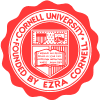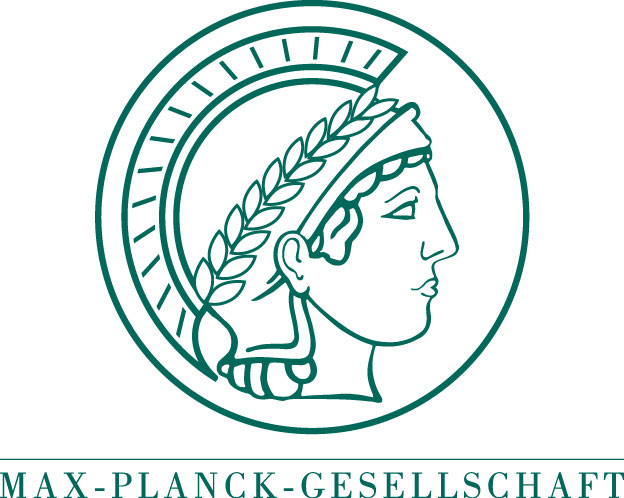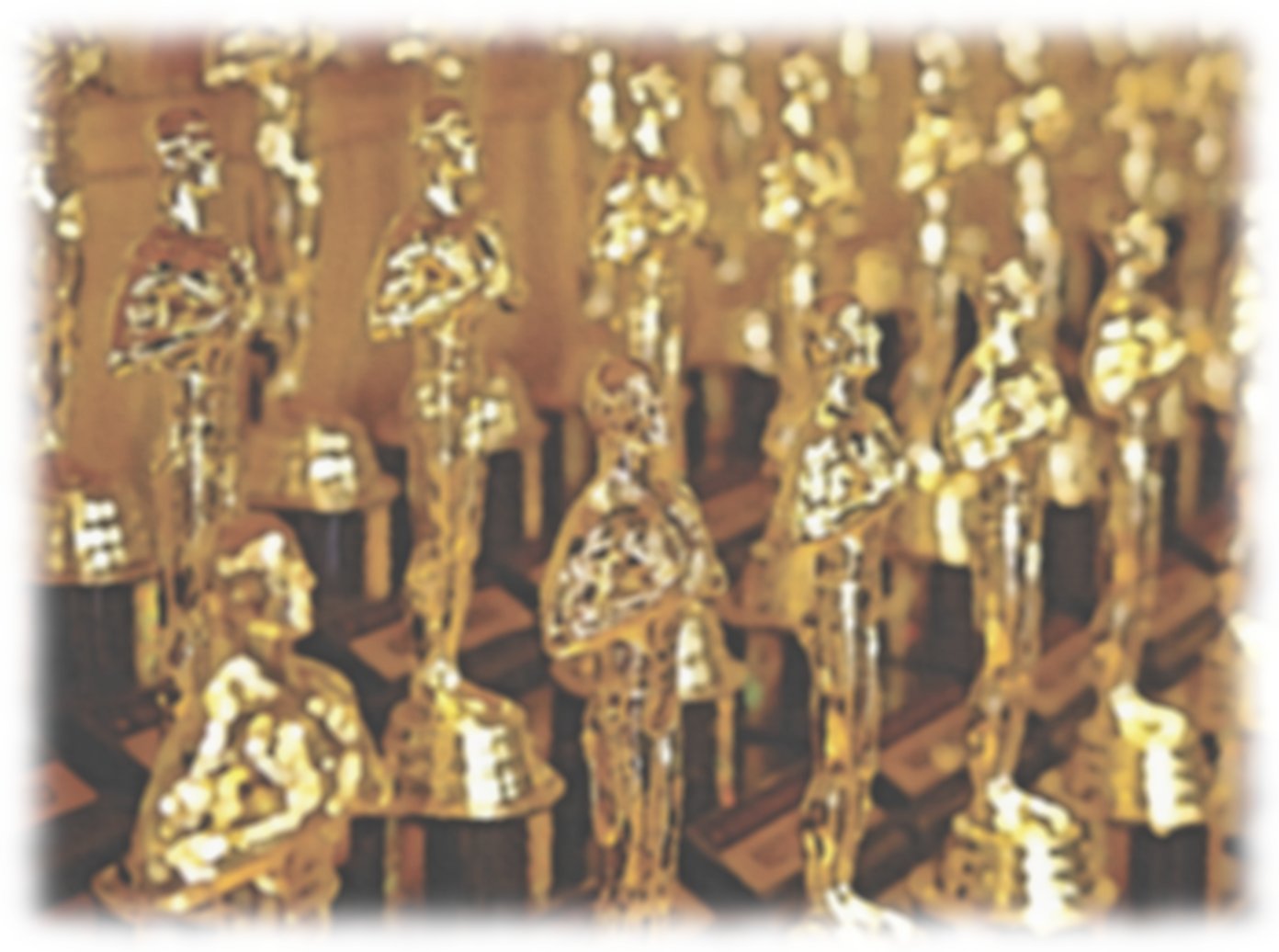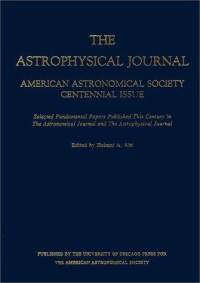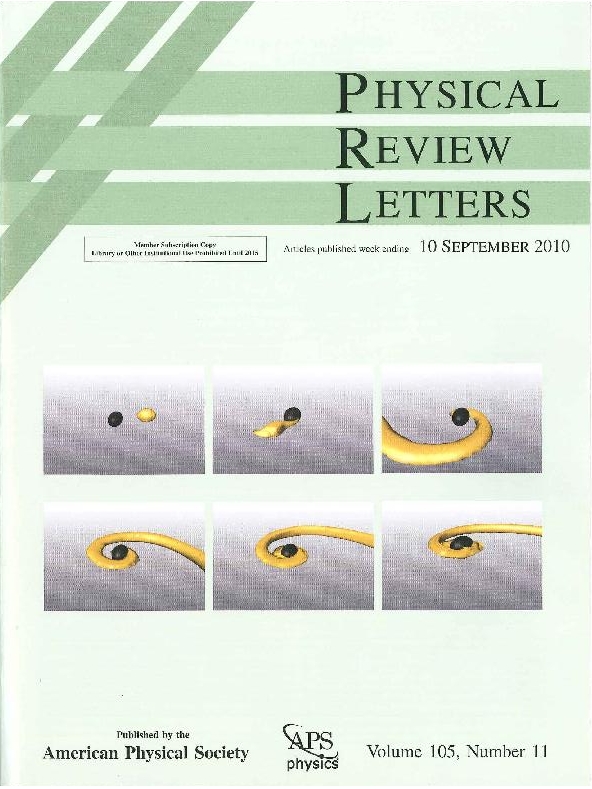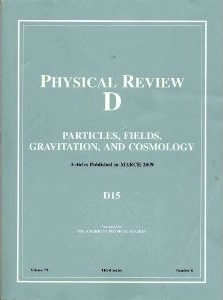
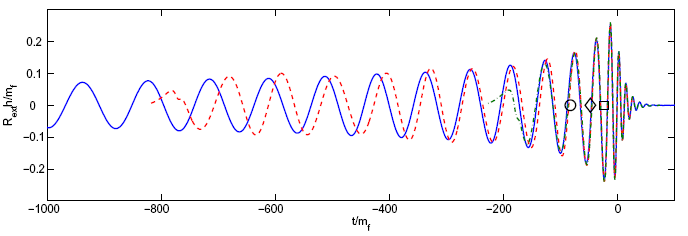
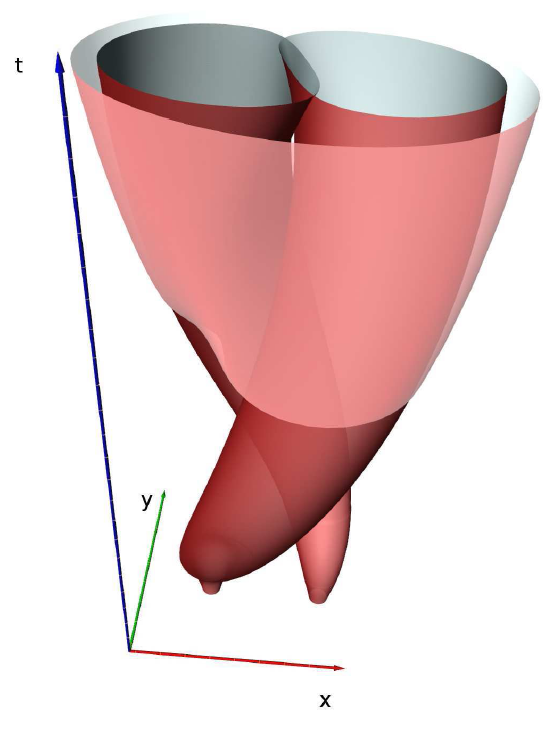






Introduction
I am a Ph.D. computational astrophysicist, software developer, and open science devotee. I currently work for RKF Engineering LLC as a simulation and model developer and engineer for long-range wireless communication systems (both ground and satellite systems). Prior to that, for five years, I worked for Giant Army as Staff Astrophysicist and Developer on Universe Sandbox, a physics simulator sandbox game currently available on Steam. Before that, I was working for the Department of Statistics at Columbia University studying open coding, open data, big data management, and statistical issues of reproducibility in the sciences. A major focus was a project called ResearchCompendia.science. ResearchCompendia.science is a web service that allows researchers to run codes associated with scientific publications. The service allows authors of publications to create companion websites on which others may reproduce the paper's results or run their own parameters. Prior to that, I worked in the field numerical relativity. I have ten years of experience designing, developing and testing massively parallel numerical simulations that evolve highly non-linear partial differential equations (the Einstein Equations) in three or more dimensions for dynamical systems (close binary black holes and neutron stars). Though my degrees are in physics, and astrophysics, I have a very strong and unique computer science background in software development and testing, numerical simulations, analysis, database management, and cluster management. My main operating system is Linux (though I use OS X since NASA). I have extensive experience with both independent and large scale collaborative software design, development, and testing. I have experience developing for parallelized simulation software (Cactus and Carpet), for distributed computing software (Einstein@Home), game development in C# and Unity (Universe Sandbox), and developing and working with visualization software (DUSTVis). I have a lot of experience with versioning systems (Git, SVN, CVS), and database management. My personal simulation codes are usually C++ (parallelized with OpenMP or MPICH). Smaller simulations are written in Python or Java. Collaborative simulation codes are sometimes Fortran. For analysis I use Python, R, Gnuplot, Octave, Matlab, Mathematica, or Maple. The scripting for simulation management and analysis I usually use Python, Ruby, bash, or Perl. I am always quick and eager to learn new languages and skills. From 2010 to late 2012 I occupied a NASA Postdoctoral Position (NPP) in the Astrophysical Sciences Division at NASA Goddard Space Flight Center doing numerical relativity and gravitational astrophysics related to the (2012 de-funded and soon to be refunded) LISA mission (Laser Interferometer Space Antenna) and relevant to LIGO (Laser Interferometer Gravitational-Wave Observatory). I received my Ph.D. from the Leibniz University of Hannover, Germany for research at the Max-Planck Institut für Gravitationsphysik (Albert Einstein Institute) in February 2010 for the thesis "Numerical Simulation of Binary Black Hole Spacetimes and a Novel Approach to Outer Boundary Conditions". I am currently living in Washington, DC. In my free time I occupy myself with open source projects, Coursera/EdX/Udacity classes, electrical engineering projects, interactive public art, fire spinning, and rock climbing. I like hunting dragons, I like rapid prototyping and I get compulsively excited about results on the horizon. I am never bored. I am passionate and hard working, but I also enjoy life and am very engaged. I do not believe these two things are separate, nor do I believe they need to clash.Education
Ph.D. Physics
magna cum laude — Aug 2005 - Feb 2010
Max Planck Institut für Gravitationsphysik
Potsdam, Germany
Thesis Title:
Numerical
Simulations of Binary Black Hole Spacetimes and a Novel
Approach to Outer Boundaries
Thesis Advisers: Luciano Rezzolla & Bernard Schutz
Thesis Advisers: Luciano Rezzolla & Bernard Schutz
- Atoms and Bits volunteer (technology workshops)
- Journal club organizer 2005-2007
- Teleconference technology support 2006-2008
- Lectures at Potsdam University
B.A., Honors Physics
Aug 2001 - May 2005Cornell University
Ithaca, NYAdviser: Saul Teukolsky
Research Emphasis: Computational Physics; Numerical Relativity;
Discrete Mathematics
- Volunteer for Big Brothers Big Sisters, Ithaca, NY
- Volunteer for Planned Parenthood of the Southern Finger Lakes 2003-2005
- Parliamentary Debate (APDA) at Cornell 2001-2002
- Treasurer for the Cornell Chapter of Sigma Phi Sigma,
Society of Physics Students 2003-2005 - Sister in Sigma Chi Delta coed service fraternity since Fall 2002
H.S. Honors A.P.
Sept 1997 - June 2001
Hayfield Secondary School
Alexandria, VA
Research Emphasis: Computer Science;
Physics; Architecture
- It's Academic Varsity Team (Patriot District Champions 1999-2000)
- College level CS (211) through George Mason University
- Poetry Club
- Orchestra 1997-1999
Keywords
numerical relativity; gravitational astrophysics; computational physics; discrete mathematics; high performance computing; massively parallel, highly scalable systems; scientific computing; distributed computing; large scale mathematical modeling; data processing and analysis; rapid prototyping; systems architectureFellowships and Grants
- Visiting Scientist Grant from Universitat de les Illes Balears for October 2010
- NASA Postdoctoral Position (NPP) 2010-2012
- International Max Planck Research School (IMPRS) Fellowship 2006-2009
- Visiting Scientist Grant from Albert Einstein Institute for Summer 2004
- NASA NY Space Grant 2003: For work under Saul Teukolsky on DUSTVis
- Fermi National Accelerator Lab Internships for Physics Majors 2002: BTeV Trigger Algorithm
- US DoD's SEAP (Science and Engineering Apprenticeship Program) 2001
- Honors Science Program at Michigan State University in the National Superconducting Cyclotron 2000
- Armed Forces Communications and Electronics scholarship and internship for summer of 1999
Awards and Honors
- James Hartle Award: talk Constraint Preserving Boundaries in 2nd Order Form at GRG18 2007
- Recognition from Graduate Women in Science (for Acoustic Thermometry of Sea Water)
- Award of Recognition: the Society of Women Engineers (Acoustic Thermometry of Sea Water)
- Award of Recognition of Outstanding Achievement 2001, US Naval Research Laboratory
- Intel Virginia State Science Talent Search 2nd place 2001 (for Longitudinal Flow in Au-Au Collisions)
- Intel Science Talent Search Semifinalist 2001 (for Longitudinal Flow in Au-Au Collisions)
- Recognition from Nat. Science Teachers Association 2000
- University of Southern California Young Scientist of the Year 2000
- CIA Outstanding Young Scientist (for Acoustic Thermometry of Sea Water)
- Physlink.com Young Scientist of the Year 2000 (for Acoustic Thermometry of Sea Water)
- Grand Prize in the 1999 NOVA Intel Science and Engineering Fair
Accomplishments
- Co-author on three of the top cited GR papers of 2009
- Curatorial team for 2012 Figment DC
- Arduino programming and electrical engineering for
lighting for new 2012 Sasha
vom Dorp piece, the Illuminator
video here, and here - Performance volunteer (fire shows) for MDA summer camp 2010-2012
- Fire Conclave (Playa del Feugo) staff for Burning Man 2009-2011 and Pyroklectic Conclave performer 2013
- Treasurer for the Cornell Chapter of Sigma Phi Sigma, Society of Physics Students 2003-2005
- Sister in Sigma Chi Delta coed service fraternity since Fall 2002
- Volunteer for Planned Parenthood of the Southern Finger Lakes 2003-2005
- Parliamentary Debate (APDA) at Cornell 2001-2002



Professional Experience
Engineer
Aug 2020 - CurrentRKF Engineering Bethesda, MD
I currently work for RKF Engineering
as a simulation and modeling engineer for wireless communivations systems. I develop software solutions,
simulations, and analyses for regulatory and advocacy work for new communications technologies.
Examples products are software to optimize resources distribution and tower switching for `connected' cities;
software to establish optimal frequencies and bands for Skywave atmospherics long range communications;
and software to establish the EPFD on the ground for large satellite constellations.
Computational Astrophysicist
2015 - 2020Giant Army Seattle, WA (remote)
I worked for Giant Army on improving the physics, planetary science,
and astronomy of Universe Sandbox.
The game is a physics-based space simulator that allows users to simulate galaxies, planetary
systems, climates, collisions, cosmological structure formation, and so much more.
Postdoctoral Researcher
2013 - 2014Columbia University
New York, NY (remote)
I worked for the Department of Statistics at
Columbia University researching issues of reproducibility, stability of models,
and issues of open data and code in the sciences. A major focus is a project called
ResearchCompendia.
ResearchCompendia is a web service that
allows researchers to run codes associated with scientific publications. The service
allows authors of publications to create companion websites on which others may reproduce
the paper's results or run their own parameters. It is entirely open source.
NASA Postdoctoral Position
2010 - 2012NASA Goddard Space Flight
Center Goddard, MD
Extended postdoctoral position in
the numerical relativity group in the Astrophysical Sciences
Division for the LISA (Laser Interferometer Space Antenna)
project. Numerical simulation of binary black hole
spacetimes, electromagnetic counterparts to black hole
interactions, and matter fields around binary black hole
systems. I developed original code for the large scale
simulations, data management, and both on-the-fly and
post-processing data analysis of the precession of spins in
binary systems.
PhD Research Scholar
June 2005 - February 2010Max-Planck Institut für
Gravitationsphysik Potsdam, Germany
PhD work on numerical simulations of
black hole spacetimes. My focus was on well-posed constraint
preserving boundary conditions. With additional work on
constraint damping methods, gravitational wave
detectability, and phenomenological wave forms and
predictions for binary final spin and kick. I wrote original
code for all of these tasks, and ran a gamut of large
simulations to cover the parameter space managed by my own
job-running scripts and data management scripts.
Visiting Scientist
June 2004 - August 2004Albert Einstein
InstitutePotsdam, Germany
Visiting
scientist in Potsdam, Germany. I wrote a parallelized
numerical code to generate initial data and evolve a
simulation of the propagation of gravitational waves off a
potential in a three dimensional coordinate system and track
constraint propagation and violation.
Undergraduate Researcher
November 2002 - October 2004Cornell
UniversityIthaca, NY
Worked for Prof. Saul Teukolsky on software for the
visualization and analysis of numerical simulations of
solutions to the Einstein equations. These included
inspiraling neutron stars and black holes systems, binary
black holes, and accretion disks. Called DUSTVis, it is an
OpenDX visualization program designed to be used with the
Caltech/Cornell DUST algorithm.
Undergraduate Researcher
December 2004 - May 2004 Cornell
UniversityIthaca, NY
Designed software for an industrial chemical waste exchange
program, titled the National Trash to Treasure Network, for
submission to the EPA as a project for voluntary
participation offered to companies as an alternative to
fines. A company can list its waste chemicals, or search for
chemicals it needs. A learning algorithm finds other chemicals with
similar properties for the buyer and evaluates the cost of
transportation and processing.
Internships for Physics Majors
May 2002-August 2002Fermi National Accelerator
LabBatavia,
Illinois
Participated in the Internship for Physics Majors
Program (IPM). I designed and programmed the
track-finding algorithm for the Level 1
Trigger Code for the BTeV project. After finding tracks, it
looks for detached tracks which signify an exotic decay,
on-the-fly in the detector firmware to determine which of the
terabytes of incoming data to store, and which to dump. I
decreased false positives 17%.
Internship
June 2001 - Sept. 2001 Naval Research
LaboratoriesWashington, District of Columbia
Worked in the Electronics Science & Technology Division on
the optimization of natural growth of Silicon dioxide, SiGe,
and SiC samples via Molecular Beam Epitaxy. Experimented
with the temperature and surface segregation dependencies of
Phosphorous doping rates via Molecular Beam Epitaxy.
Internship
May 2000 - August 2000 Michigan State
UniversityEast Lansing, Michigan
I
worked in the National Superconducting Cyclotron at Michigan
State University. I wrote data analysis code in C++ and did
the analysis of data collected of Gold on Gold collisions at
energies from 20-60 AMeV for a better understanding of flow
through in stellar core collapses.
Publications
- J. Seiler. Numerical Simulation of Black Hole Spacetimes and a Novel Approach to Outer Boundary Conditions. Leibniz Universität Hannover Physics Library. Link: THESIS
- L. Rezzolla, P. Diener, E. N. Dorband, D. Pollney, C. Reisswig, E. Schnetter, J. Seiler. The Final Spin From the Coalescence of Aligned-spin Black-hole Binaries. Astrophysical Journal 674 (2008) L29. Preprint: arXiv.org:0710.3345 [gr-qc]
- L. Rezzolla, E. Barausse, E.N. Dorband, D. Pollney, C. Reisswig, J. Seiler and S. Husa. On the final spin from the coalescence of two black holes. Physical Review D 78 (2008) 044002. Preprint: arXiv:0712.3541 [gr-qc]
- J. Seiler, B. Szilagyi, D. Pollney. Constraint Preserving Boundaries for a Generalized Harmonic Evolution Systems. Classical and Quantum Gravity 25 (2008) 175020. Preprint: arXiv:0802.3341 [gr-qc]
- B. Aylott, et al.(including J. Seiler). Testing gravitational-wave searches with numerical relativity waveforms: Results from the first Numerical INJection Analysis (NINJA) project. Classical Quantum Gravity 26 (2009) 165008. Preprint: arXiv:0901.4399 [gr-qc].
- B. Aylott, et al.(including J. Seiler). Status of NINJA: the Numerical INJection Analysis project. Classical Quantum Gravity 26 (2009) 114008. Preprint: arXiv:0905.4227 [gr-qc]
- C. Reisswig, S. Husa, L. Rezzolla, E. Dorband, D. Pollney and J. Seiler. Gravitational-wave detectability of equal-mass black-hole binaries with aligned spins. Physical Reveiw D 80 (2009) 124026. Preprint: arXiv:0907.0462 [gr-qc]
- L. Santamaria, F. Ohme, P. Ajith, B. Bruegmann, N. Dorband, M. Hannam, S. Husa, P. Moesta, D. Pollney, C. Reisswig, E. L. Robinson, J. Seiler, B. Krishnan. Matching post-Newtonian and numerical relativity waveforms: systematic errors and a new phenomenological model for non-precessing black hole binaries. Physical Reveiw D 82 (2010) 064016. Preprint: arXiv:1005.3306 [gr-qc]
- P. Ajith, M. Hannam, S. Husa, Y. Chen, B. Bruegmann, N. Dorband, D. Muller, F. Ohme, D. Pollney, C. Reisswig, L. Santamaria, J. Seiler. ``Complete'' gravitational-waveforms for black-hole binaries with non-precessing spins. Phys. Rev. Lett. 106 (2011) 241101. Preprint: arXiv:0909.2867 [gr-qc]
- V. Stodden, S. Miguez, J. Seiler. ResearchCompendia.org: Cyberinfrastructure for Reproducibility and Collaboration in Computational Science. IEEE Computing in Science & Engineering 17(1) (2015) 12-19. Link: Scientific Software Communities
- V. Stodden, J. Seiler, Z. Ma. An empirical analysis of journal policy effectiveness for computational reproducibility. Proceedings of the National Academy of Sciences 115.11 (2018): 2584-2589. Link: 10.1073/pnas.1708290115
Manuscripts
- J. Seiler, J. Baker, B. Kelly. Precession Mapping of Black Hole Binaries via Minimization of Asymmetric Harmonic Modes of Gravitational Waves. [in preparation: scooped]
- J. Seiler, D. Pollney, B. Wardell, D. Nunez. Constraint Preserving Boundary Conditions for BSSN in the Linearized Regime. [scrapped, scooped Jan 2012]
- J. Seiler, S. Husa, J. Baker. Numerical Simulation of Black Hole Binaries with `Trumpet' Initial Data. [in preparation: July 2012]
Contributed Talks
- "ResearchCompendia: Connecting Computation to Publication"
University of Texas Austin, TX, USADecember 16, 2013Scientific Software Days
- "Binary
Orbital Dynamics from the Analysis of Spherical Harmonic
Modes of Gravitational Waves"
University of Maryland College Park, USANovember 20, 2011Gravity Theory Seminars
- "Gravitational-wave
Detectability of Black-hole Binaries With Aligned Spins"
NASA Goddard Space Flight Center, MD, USAMarch 26, 2010Astrophysics Sciences Division Director's Seminar
- "Numerical
Simulation of Binary Black Hole Spacetimes and a Novel
Approach to Outer Boundary Conditions"
Leibniz University of Hannover, Hannover, GermanyFebruary 5, 2010PhD Thesis Disputation
- "Final
Spin from Binary Black Hole Coalescence"
Salamanca, SpainSeptember 19, 2008XXXI Spanish Relativity Meeting (E.R.E. 2008)
- "From General Relativity to Black Hole Observation"
Salamanca, SpainSeptember 19, 2008XXXI Spanish Relativity Meeting (E.R.E. 2008) (plenary talk)
- "Final
Spin from Binary Black Hole Coalescence"
California Institute of Technology, Pasadena, CA, USAAugust 22, 2008TAPIR Theoretical Astrophysics and Relativity Seminar
- "Constraint Preserving Boundary Treatment for the Einstein Equations in 2nd Order Form"
Albert Einstein Institute (and others), Potsdam, GermanyJanuary 21, 2008SFB/Transregio 7 Video Seminar
- "2nd Order in Space Constraint Preserving Summation by Parts Boundaries"
Puerto de la Cruz, Tenerife, SpainSeptember 12, 2007XXX Spanish Relativity Meeting (E.R.E. 2007)
- "Constraint
Preserving Boundary Treatment in 2nd Order Form"
Sydney, AustraliaJuly 13, 200718th International Conference on General Relativity and Gravitation (GRG18)
- "Boundary Treatments for the Einstein Equations in 2nd Order Form"
Palma de Mallorca, SpainSeptember 6, 2006XXIX Spanish Relativity Meeting (E.R.E. 2006)
- "Generalised Harmonic Coordinates in 2nd Order"
AEI, Potsdam, GermanyNovember, 2005Sonder-Forschungsbereich / TransRegio 7 Video Seminars
- "Generalised
Harmonic Coordinates using Abigel"
Oberjoch, GermanyOctober 13, 20052005 Oberjoch Seminars
Workshops and Conferences
- PyCon 2014
Montreal, Quebec, CanadaApril 11-13, 2014
- Scientific Software Days 2013
Austin, TX, USADecember 16-17, 2013
- 19th International Conference on General Relativity and Gravitation (GRG19)
Mexico City, MexicoJuly 5-10, 2010
- Numerical Relativity and Data Analysis/CAPRA Meeting (NRDA/CAPRA 2010)
Waterloo, CanadaJune 20-26, 2010
- Numerical Relativity and Data Analysis Meeting (NRDA 2009)
Golm, GermanyJuly 6-9, 2009
- XXXI Spanish Relativity Meeting (E.R.E. 2008)
Salamanca, SpainSeptember 15-19, 2008
- Numerical Relativity and Data Analysis Meeting (NRDA 2008)
Syracuse, NYAugust 11-14, 2008
- Frontiers in Numerical Gravitational Astrophysics (J.A. Wheeler School)
Erice, ItalyJune 27-July 5, 2008
- Post Newton 2008 International Workshop
Jena, GermanyJune 11-14, 2008
- XXX Spanish Relativity Meeting (E.R.E. 2007)
Puerto de la Cruz, Tenerife, SpainSeptember 10-14, 2007
- 18th International Conference on General Relativity and Gravitation (GRG18)
Sydney, AustraliaJuly 8-14, 2007
- AEI Performance Improvement Workshop
Albert-Einstein-Institut, Potsdam, GermanyDecember 4-15, 2006
- From Geometry to Numerics Workshop
Institut Henry Poincaré, Paris, FranceNovember 20-24, 2006
- XXIX Spanish Relativity Meeting (E.R.E. 2006)
Palma de Mallorca, SpainSeptember 4-8, 2006
- New Frontiers in Numerical Relativity Conference
Albert-Einstein-Institut, Potsdam, GermanyJuly 17-21, 2006
- 3rd High-End Visualization Workshop
University of Innsbruck, Obergurgl, AustriaApril 25-28, 2006
- 2005 Oberjoch Seminars
University of Tübingen, Oberjoch, GermanyOctober 10-14, 2005

Skills and Abilities
OS/WM:
- Linux (preferred)
- Mas OS
- Unix
- DOS
- Windows
Programming:
- C/C++/C#
- Python
- Java
- Perl
- Fortran
- XML
- SQL
- Basic
- APIs
- Ruby
- HTML5/CSS
- Javascript
- LaTeX
- MATLAB
- PHP...
Dev Frameworks:
- Agile (SAFe):
- Azure
- Jira
- ZenHub
- Jama
- Scrum/Kanban:
- Trello
- OneNote
- WeKan
- Keep
Libraries & Software
- Unity
- OpenDX
- NumPy/SciPy
- iPython
- Arduino
- Lustre
- LENA
- SEM
- GDAL
- AWS
- KML
- Travis
- PBS
- Scali
- OpenMPI
- MPICH
- Cactus
- Hadoop ...
Proficient with:
- Photoshop (CS)
- Ableton
- emacs
- vi
- Apache
- PAW
- VisIt
- Mathematica
- AutoCAD
- 3d Studio Max
- Maxima
- Flash ...
IDEs:
- Visual Studio
- VS Code
- emacs & vi
- Xcode
- Spyder
- Eclipse
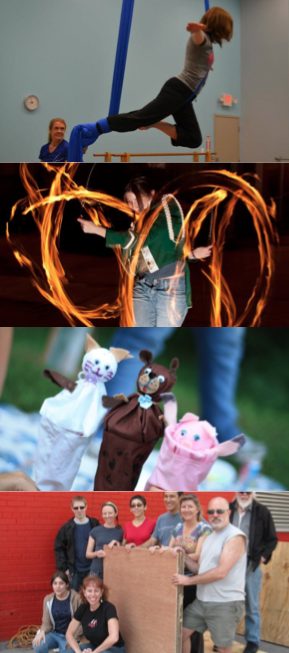
Extracurricular Activities
Outreach/ Public Speaking:
- Atoms and Bits volunteer (tech workshops)
- Lectures for: Science Cafe, Knowledge Commons DC, Burner Salon, UMD CP...
- Science outreach for: Ithaca Science Center, Cornell SPS...
- Science Fair judging for: Prince Georges County, Columbia Heights...
- Led Arduino tech workshop Craft Days
- Children's Burn (Fire and Swine) setup/performance (non-newtonian fluids on a speaker and 'dancing' ferrofluids)
- Adult "Science! Party" Science Fair organizer & judge.
- Semi-professional Fire performance (Poi, Rope Dart, Staff, Breathing)
- Volunteer performer for MDA summer camp 2010-2011
- Aerial silks (tissu)
- Indoor and outdoor rock climbing
- Hiking, Skiing, Kayaking....
- Mischief DC board of directors
- Volunteer for Big Brothers Big Sisters
- Volunteer for Planned Parenthood
- Curatorial team for 2012 Figment DC
- Sister in Sigma Chi Delta coed service fraternity since Fall 2002
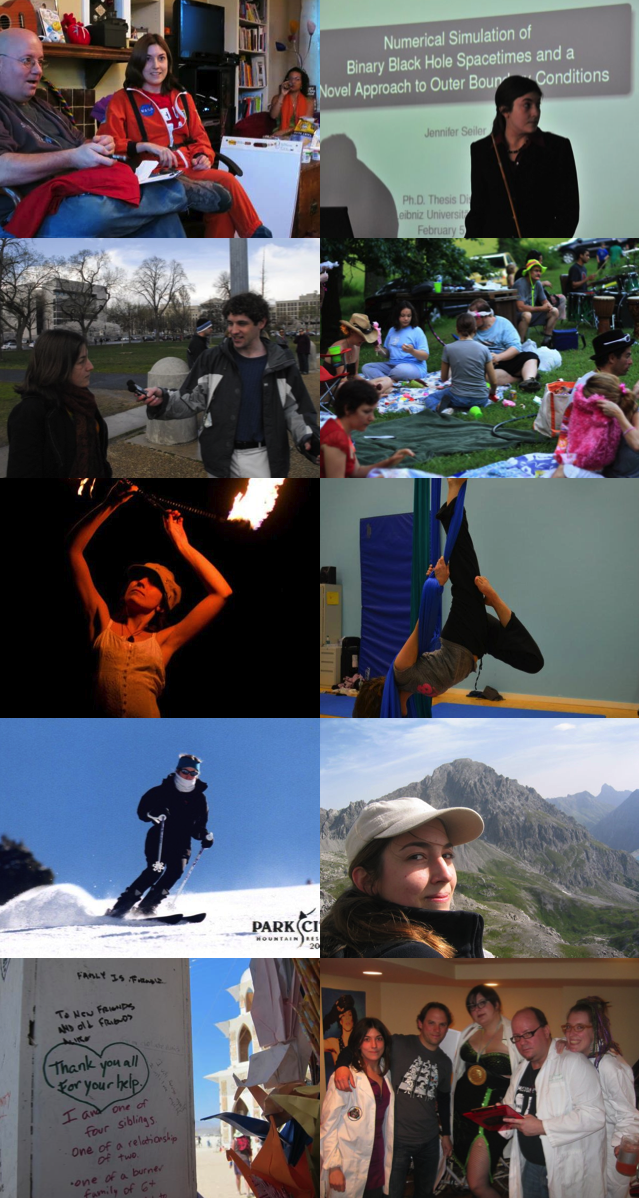
Comments:
Be nice!I do filter!
Projects and Accomplishments
Universe Sandbox 
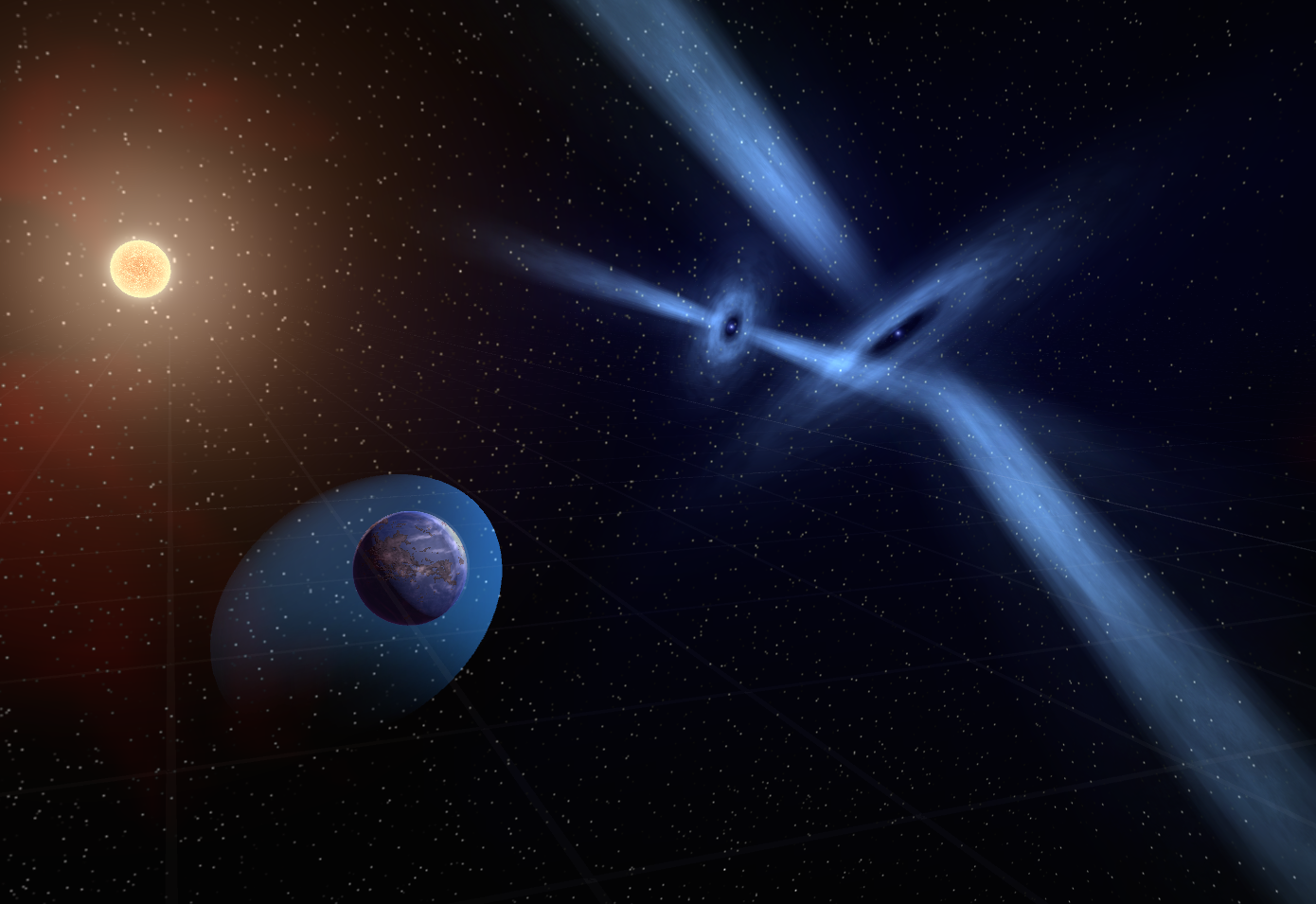 Universe Sandbox is a Physics simulator sandbox game. It has live N-body newtonian gravity simulation, collision physics, climate simulation, stellar evolution, magnetic fields, terraforming, materials phase tracking, and educational tutorials.
Universe Sandbox is a Physics simulator sandbox game. It has live N-body newtonian gravity simulation, collision physics, climate simulation, stellar evolution, magnetic fields, terraforming, materials phase tracking, and educational tutorials. As the astrophysicist, and a developer on the team, I have developed stellar evolution simulation, magnetic field simulation (including pulsars), life likelihood simulation, climate simulation for generic planets, volatile tracking (for things such as Jeans Escape, solar wind erosion, material drag, and many other incident fluxes and internal sources of mass loss) and much more. There seems to be no end to the features we can add. I also want to add Post Newtonian corrections for simulations black holes and neutron stars.
Cactus 
The Cactus Computational
Toolkit (CCT) is an open source problem solving
environment designed for scientists and engineers. Its modular
structure enables parallel computation across different
architectures and collaborative code development between
different groups. The name Cactus comes from the design of a central core ("flesh") which connects to application modules ("thorns"). Thorns can implement custom developed applications. Other thorns from a standard computational toolkit provide a range of computational capabilities, such as parallel I/O, data distribution, or checkpointing.
The Einstein Toolkit addresses computational relativistic astrophysics, supporting simulations of black holes, neutron stars, and related systems.
I helped to develop multiple "thorns" for Cactus, including:
- the AEIHarmonic evolution code for evolving full 3D evolutions of the Einstein Equations
- two well-posed, constraint preserving boundary conditions thorns for two different coordinate systems
- Teukolsky Wave initial data thorn
- Multiple visualization thorns
- Many analysis thorns, including horizon mass estimation, and spin orientation analysis
- I contributed to adaptive mesh refinement, I/O, overall optimization, and cross architecture compatibility
Carpet 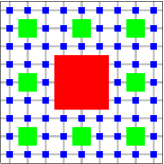
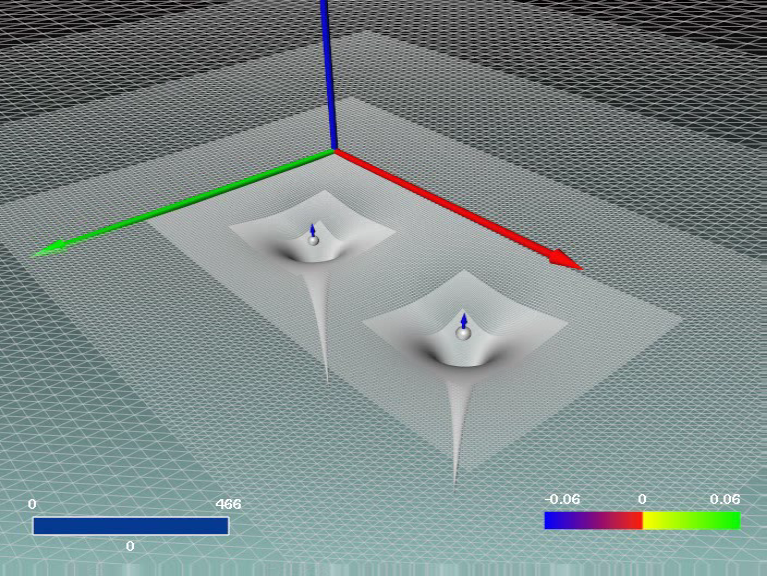 "Carpet is an
adaptive mesh refinement and multi-patch driver for the
Cactus Framework. Together they form a software framework for
solving time-dependent partial differential equations on
block-structured grids. Carpet acts as driver layer
providing adaptive mesh refinement, multi-patch
capability, as well as parallelisation and efficient
I/O."
"Carpet is an
adaptive mesh refinement and multi-patch driver for the
Cactus Framework. Together they form a software framework for
solving time-dependent partial differential equations on
block-structured grids. Carpet acts as driver layer
providing adaptive mesh refinement, multi-patch
capability, as well as parallelisation and efficient
I/O."I contributed to the optimization, IO, memory allocation and parallelisation, and scalability.
DUSTVis
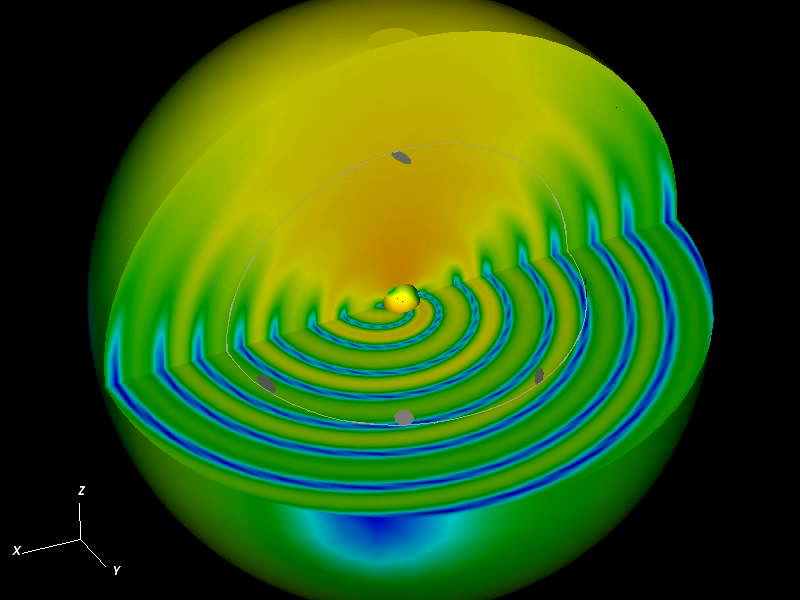 In my time at Cornell I helped develop on software for the
visualization and analysis of numerical simulations of
solutions to the Einstein equations. These included
inspiraling neutron stars and black holes systems, binary
black holes, and accretion disks. Called DUSTVis, it is an
OpenDX visualization program designed to be used with the
Caltech/Cornell DUST algorithm for visualizing data from
multiple three dimensional grids with multiple coordinate
systems. In additions to the coordinate transformation and
C++ OpenDX module boxes for visualization, I developed a
UI for both the data IO, and the visualization
parameters.
In my time at Cornell I helped develop on software for the
visualization and analysis of numerical simulations of
solutions to the Einstein equations. These included
inspiraling neutron stars and black holes systems, binary
black holes, and accretion disks. Called DUSTVis, it is an
OpenDX visualization program designed to be used with the
Caltech/Cornell DUST algorithm for visualizing data from
multiple three dimensional grids with multiple coordinate
systems. In additions to the coordinate transformation and
C++ OpenDX module boxes for visualization, I developed a
UI for both the data IO, and the visualization
parameters.
Co-Author on Three of the Top Cited GR Papers of 2009
The three were: "Testing gravitational-wave (GW) searches with numerical relativity waveforms: Results from the first Numerical INJection Analysis (NINJA) project", "On the final spin from the coalescence of two black holes", and "The Final spin from the coalescence of aligned-spin black-hole binaries". I entered the field of numerical relativity two years before the first successful binary black hole simulation in 2005. Since then I have been involved in some of the major discoveries of the field:- Developed a phenomenological formulae to predict the final spin, recoil, and orientation of a merged black hole given only initial data from the originating binary system.
- We worked with data analysts with the LIGO detector in the NINJA project to test how successful our detector pipelines would be at identifying signals matched against the database of our numerical waveforms.
- We matched post-Newtonian waveforms for binaries with large separations to numerically generated waveforms for close in binaries where only numerical simulations can deal with the non-linearity of the system to produce very long and accurate waveforms for GW detection.
PhD Thesis: Numerical Simulation of Black Hole Spacetimes
I received a fellowship from the International Max-Planck Research School to do my PhD at the best institution in the world for numerical relativity, the Max-Planck Institut für Gravitationsphysik (Albert Einstein Institute). They have super-computer clusters devoted exclusively to relativity, and a large scale collaborative "toolkit" for numerical simulation called Cactus, written in C++. With gravitational wave detectors at design sensitivity the need for numerical GW templates for signal recognition by detector pipelines is an urgent problem. With that in mind, and the fact that binary black hole inspirals and mergers are the strongest potential source for GW signals, my research focused on improving numerical simulations, and on the generation of GWs both for detector templates and for astrophysics.I formulated a set of boundary conditions for artificial boundaries for a first order in time and second order in space formulation of the Einstein equations. I showed that these conditions reduce noise, reduce constraint violation, and increase stability for 3D simulations. My boundary conditions are now used in numerical simulations both within and outside of the field of numerical relativity.
ResearchCompendia.org: Connecting Publication to Computation
The ResearchCompendia platform is an attempt to use the web to enhance the reproducibility and verifiability -- and thus the reliability -- of scientific research. We provide the tools to publish the "actual scholarship" by hosting data, code, and methods in a form that is accessible, trackable, and persistent. Some features include:- Remote executability of contributed code for a variety of coding languages and frameworks, and enhancing output presentation.
- DataCite DOI issuing for compendia, and uploaded code and data objects.
- Customized portals for journals and institutions requiring differential access and tracking.
- Entirely open source platform written in Django (python).
